Leaking Roofs, Stinking Toilets… Barracks Life For Nigerian Soldiers And Their Relatives
Despite being the principal actors in the fight against insecurity, the living conditions of many soldiers in the country are unpleasant—and that is putting it mildly.
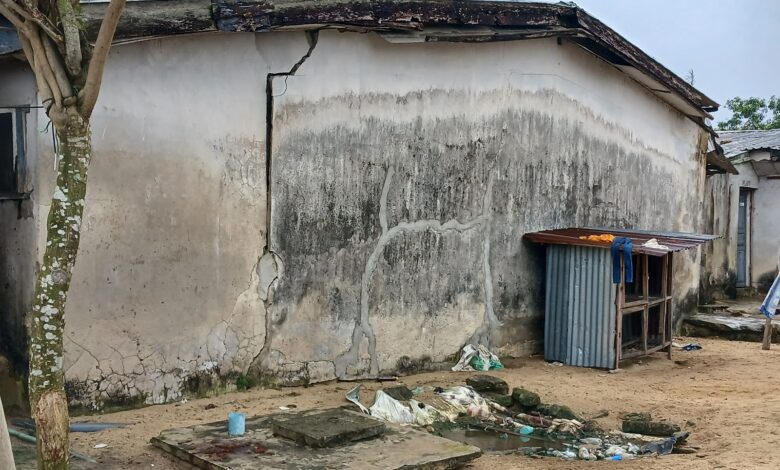
Bolajoko Joseph is the widow of a senior officer in the Nigerian Army. Oladapo Joseph, her late husband, died at work on Aug. 2, 2012, after a prolonged heart disease. He was one of the 700 Nigerian soldiers deployed by the Economic Community of West African States Monitoring Group (ECOMOG) to Sierra Leone in the 90s.
When Oladapo returned to Nigeria in 2000, he was posted to the 9 Brigade Ikeja Cantonment in Lagos. The bomb blast that occurred in Ikeja two years later made his health worse. Family members were told at the hospital that he had an enlargement of the heart. He was placed under medication, and they relocated to Ojo Barracks.
But the accommodation was distasteful.
“We were given a dilapidated structure. We had to spend the money that we should ordinarily use to take care of my ailing husband in renovating our room because it was inhabitable,” recalled Bolajoko.
A few weeks after moving to the barracks, a wall in one of their rooms fell apart, leaving them to pass the night in the cold for days.
HumAngle learnt that though Bolajoko and her husband complained about the building’s poor state to the leadership of the barracks, no action was taken.
“At some point, I told my husband that it appears the military authorities do not care about our welfare. They just want to use and dump military personnel.
“What disturbed my husband more was that most of the buildings in the barracks were not habitable. So, it was difficult to leave where we were occupying for another vacant room beside ours,” she told our reporter.
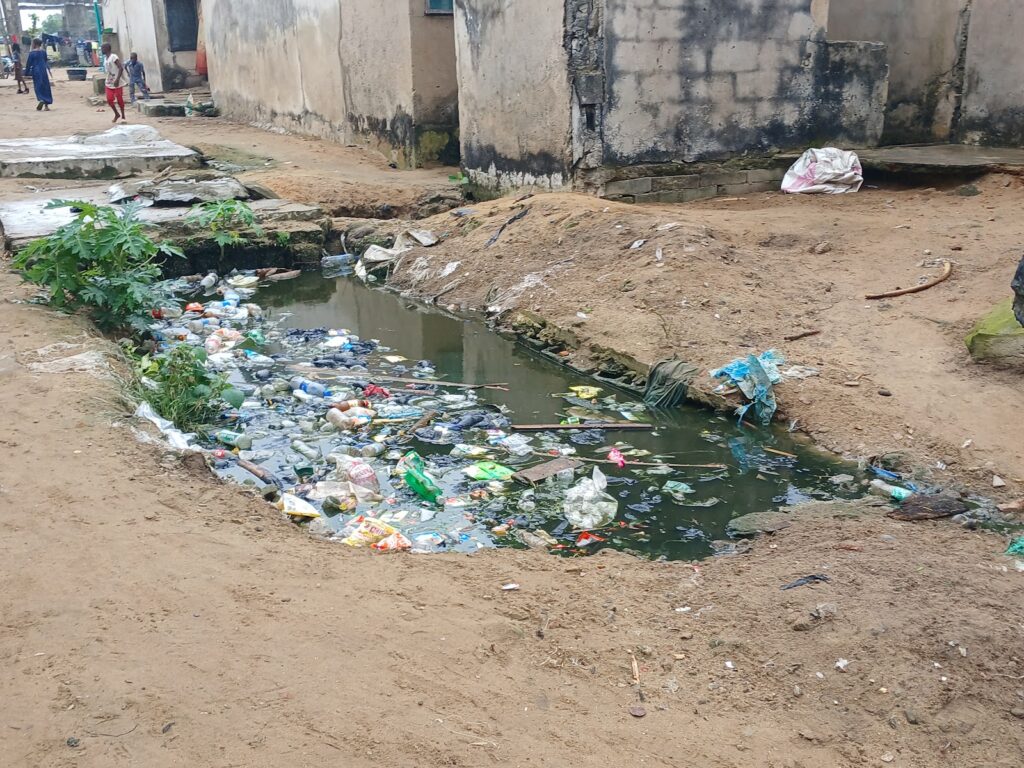
Despite the risk, the family continued to live in the barracks, renovating their accommodation with little savings from Oladapo’s salary. But in 2012, he collapsed and died at work.
His death exposed Bolajoko and her children to even harsher conditions in the barracks because they no longer had money to maintain the building, which was on the verge of collapse.
“One of the senior officers who came to visit us after my husband’s death said no government would repair anything for us. We had to do it by ourselves. He said we should just note the amount spent on renovation and try to get reimbursement from any family that moved into the building whenever we were vacating the barracks.”
One incident finally pushed Bolajoko to move out. She had gone to the market when it started raining. By the time she returned, she saw all her properties soaked with water as a result of leaking roofs.
“That was the day I decided to pack out because my valuables got spoiled. I had to sell some of the properties because I had nowhere to keep them. My church members got me a building where I currently occupy.”
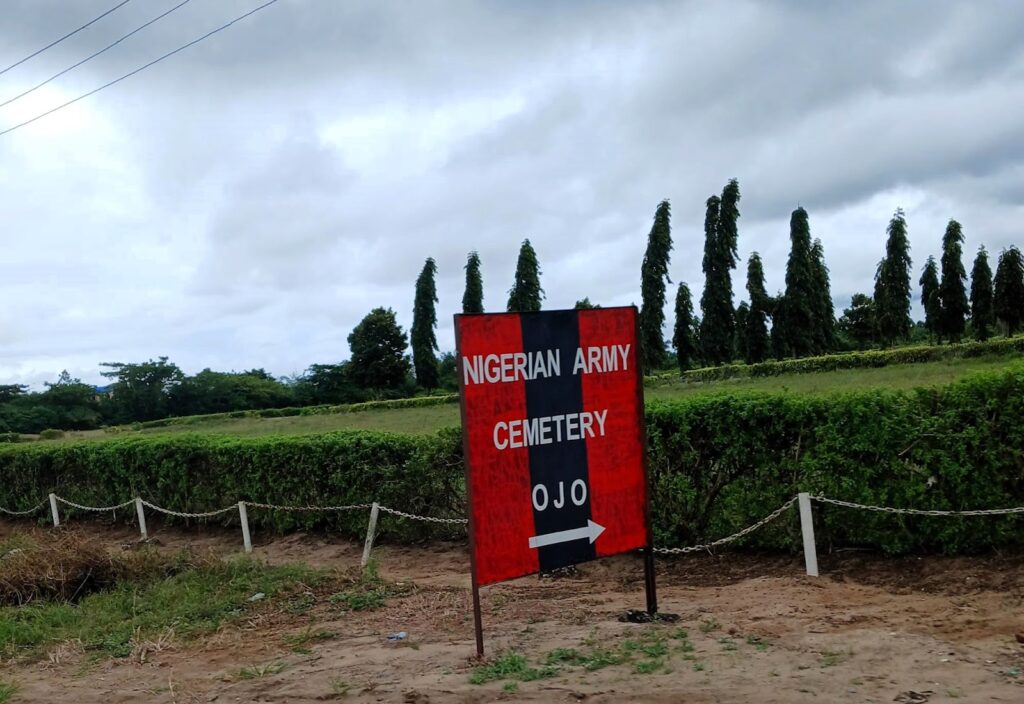
‘Slums as military barracks’
An army barracks is a community designed to house soldiers and their relatives. There are different barracks across Nigeria, developed to give soldiers a comfortable life.
However, many barracks in the country are poorly maintained and need infrastructural upgrades. Even as Nigerian soldiers battle insurgents, their families are left to suffer in deplorable conditions.
From Ojo barracks in Lagos to Odogbo barracks in Ibadan, Ede barracks in Osun, Namse barracks in Makurdi, Akim barracks in Calabar, and many others, soldiers told HumAngle that their accommodations are not only decrepit but also inadequate.
While many usually rent apartments outside the barracks, those fortunate enough to secure accommodation within the premises, like Bolajoko’s family, are forced to spend out of pocket on substantial renovation so as to make the structures befitting for living.
HumAngle learnt that some of the barracks lack basic amenities such as electricity, potable water, and toilets. In some cases, they have to queue to use the few available toilets and bathrooms.
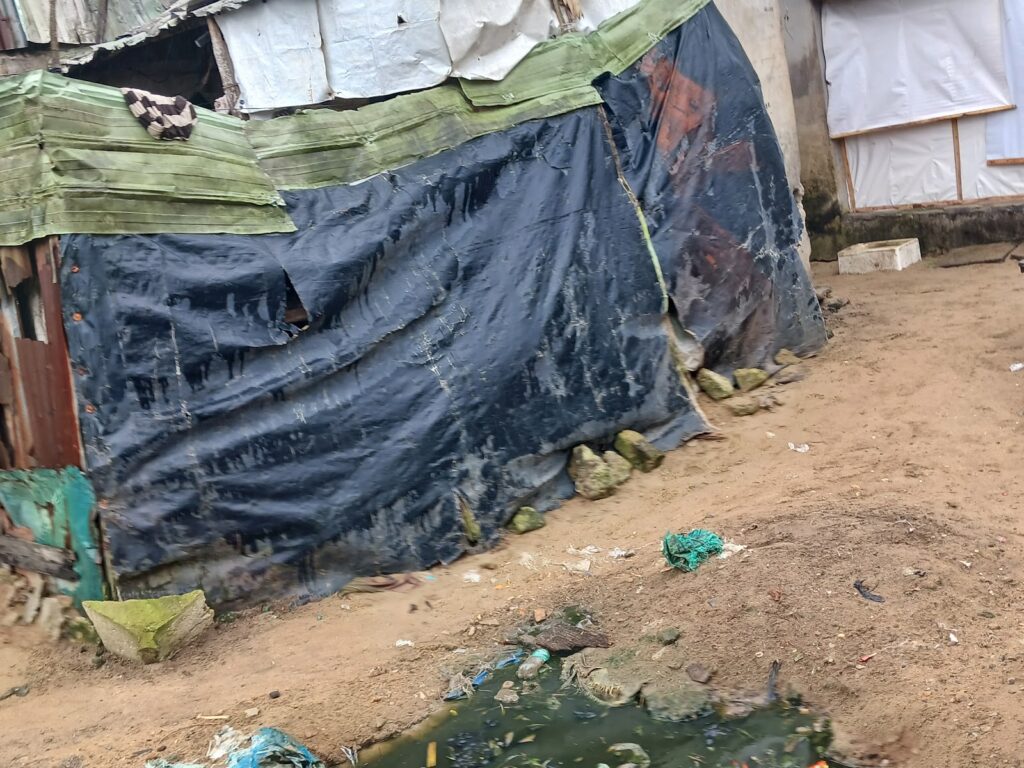
During our visit to the Ojo barracks, HumAngle saw broken sewage pipes and stinking drainages that showed signs of abandonment. Our reporter observed overflowing septic tanks containing human waste materials without proper cover.
Emelia Orji, the widow of a soldier who died at the battlefront in 2015 while fighting Boko Haram insurgents in Borno, used to occupy a dingy room in a block of 10 flats at the barracks. Last year, her church members gave her some money to rent an apartment because she had yet to get her husband’s entitlements from the Army.
Before vacating the barracks, the poor living conditions at Ojo cantonment made her cry sometimes, she said.
“My daughter questioned me on why her father joined the Army considering the frustration faced living in the barracks. The flies that surrounded the broken soakaway sometimes touched our meals, leading to typhoid fever,” Emelia told HumAngle.
“I endured for a long time because I couldn’t afford a better accommodation. People are subjected to inhumane treatment in the barracks. Most soldiers here would have left with their families, but they continue to accept their fates because of financial challenges.”
Asked why soldiers do not speak out about the difficulties they are facing, an officer said they are afraid, explaining that “what happens in the military ends in the military.”
In the 2022 budget signed by ex-president Muhammadu Buhari, over ₦1 billion ($1.3 million) was earmarked for the rehabilitation of dilapidated houses and infrastructure in military barracks.
The renovation was said to be directly supervised by the Ministry of Defence. When contacted for updates on the renovations, the spokesperson of defence headquarters, Tukur Gusau, directed our reporter to army spokesperson, Onyema Nwachukwu.
But Nwachukwu is yet to respond to enquiries.
Government spending data available on Govspend also showed that in June this year, over ₦611 million ($800,000) was paid to the Nigerian Army Finance Corps for renovation works at barracks across the country. An additional ₦299 million ($391,000) was released by various government offices, mostly the Ministry of Defence, for the rehabilitation of barracks between 2021 and 2022.
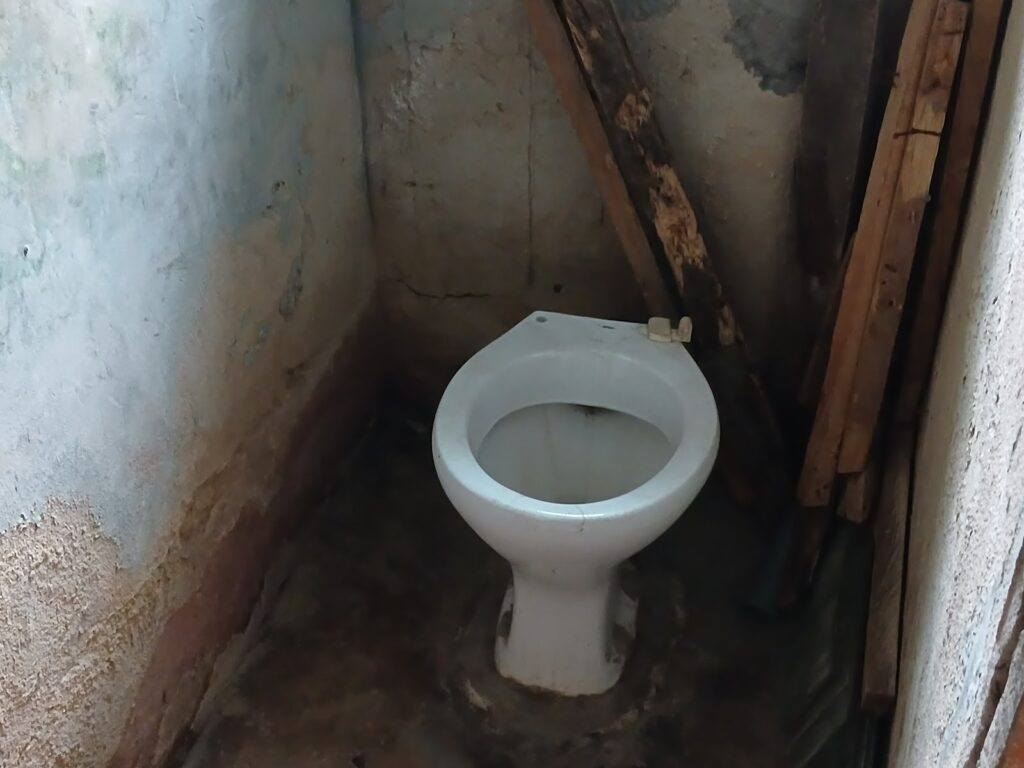
Leaking roofs
Back at Ojo barracks, several soldiers and their families lament how they have suffered in silence for years with no recourse in sight.
It is common to see tires on the rooftops of buildings at the barracks. HumAngle learnt that the primary reason is to add weight and stability.
“There are days when strong winds and rain lift and damage the roof. We use the tires to hold them in place, so they don’t get blown away,” a soldier explained.
For roofs that had blown off in the past, tires are placed on them as a temporary solution to prevent further water leaks until a professional repair is done.
“I am also scared that the house may collapse anytime. Each time it rains, water pours on my mattress and other valuables. I always pray that rain doesn’t fall at midnight because it means I will stand through the night and watch over my properties. I cannot continue to repair the roof with my salary,” said a frustrated officer, who asked to be anonymous because she feared she might be sanctioned.
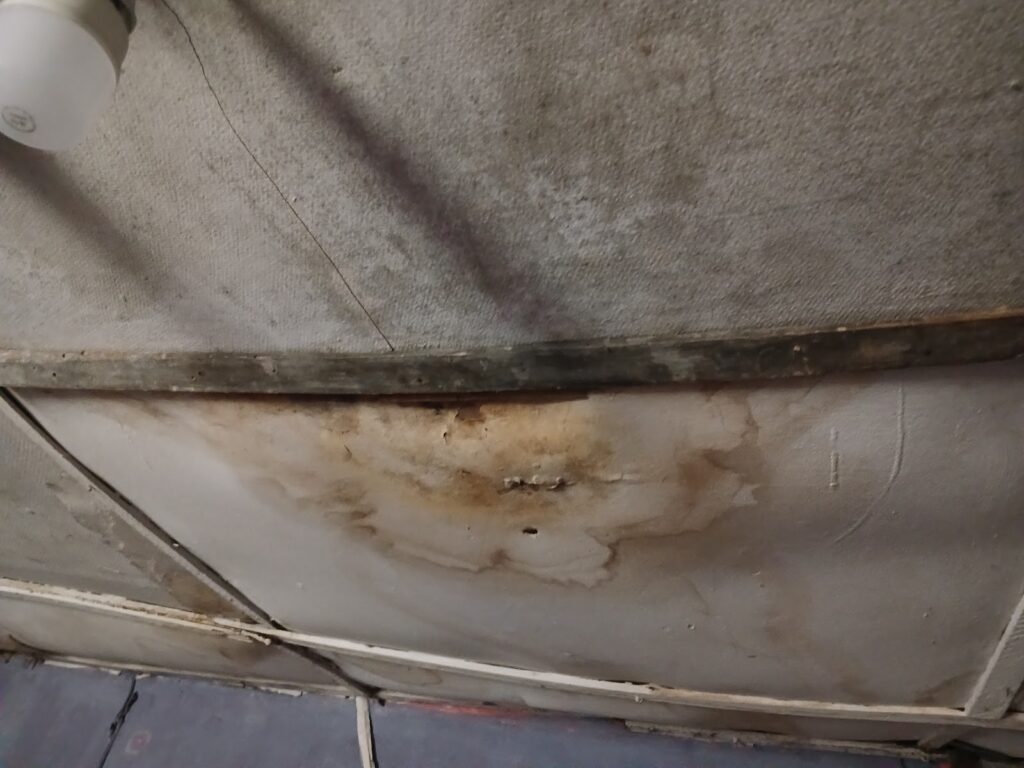
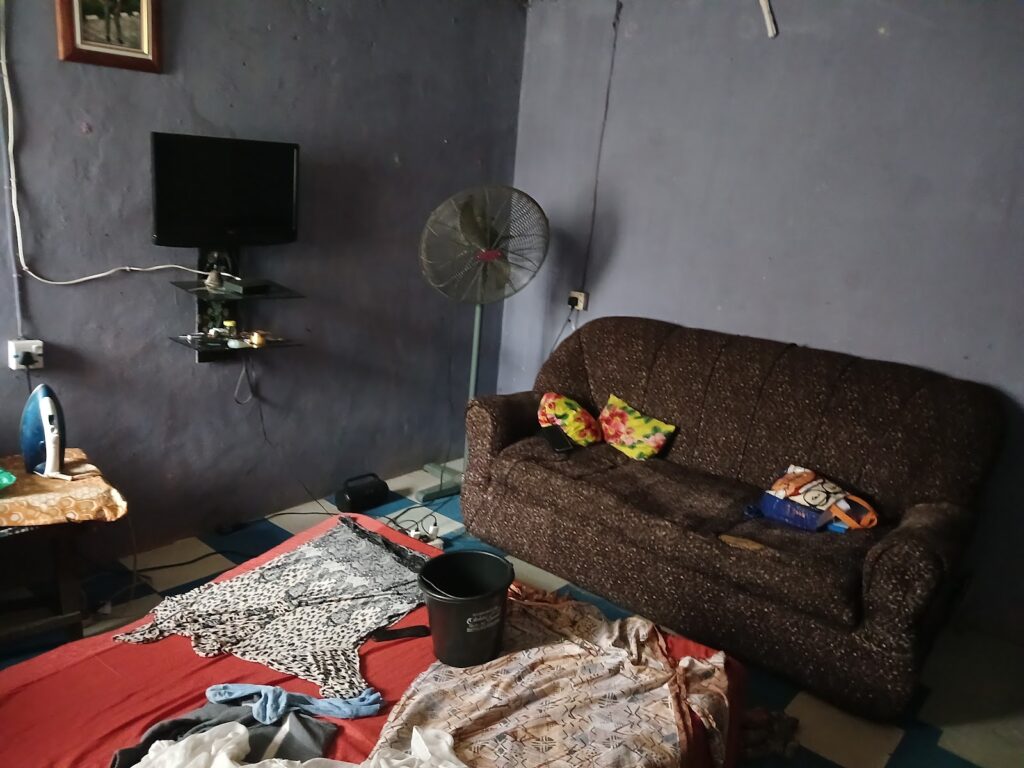
She was visibly angry as she spoke. It rained when we visited, so our reporter witnessed how the soldier placed a bucket on her mattress to prevent it from getting soaked by water dripping from the roof.
Like her, many people are scared that the buildings might break down anytime. Because of this, they usually stay out of their rooms when it rains, especially during the day.
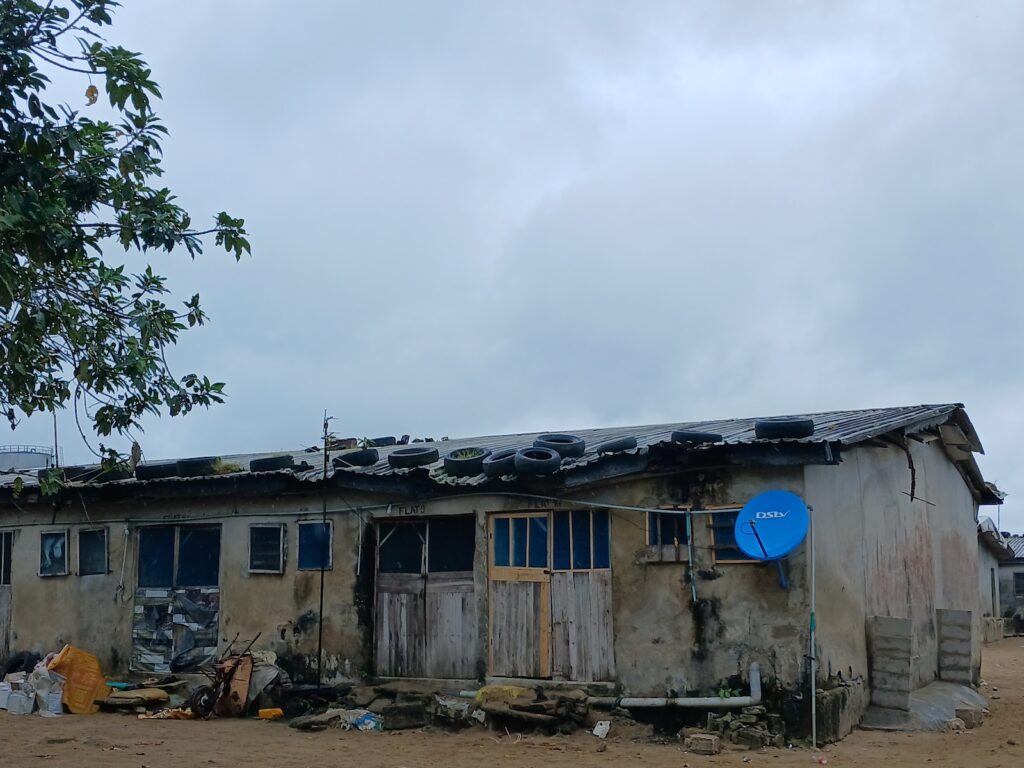
Water shortage
Sources in the barracks told our reporter that many soldiers own a pushcart that helps to convey up to a dozen jerry cans of water to their houses.
“A soldier made a borehole with his money, so he collects money from anyone who wants to fetch water. People pay roughly ₦2,000 ($3) monthly. We have to queue for hours to get the water except you go there very early, around 4 a.m.
“The scarcity of water makes me monitor my children not to waste water. They are still very young to even fetch. My husband also helps anytime he’s around,” said the wife of a soldier.
She said her husband is in the North East fighting insurgents. For over a decade, the Nigerian government has engaged in a war with insurgent groups seeking to establish a state governed by extremist Islamic principles in northeastern Nigeria.
“Imagine, my husband and many others are defending Nigeria, and their relatives are here suffering. It is really a painful experience.”
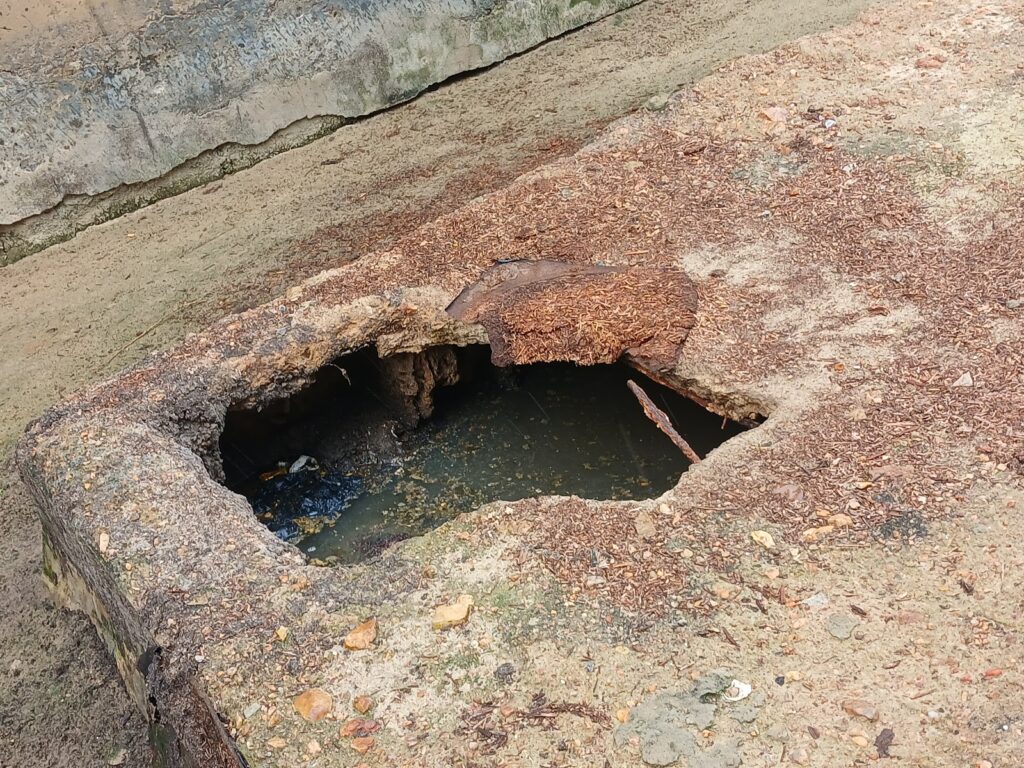
Authorities aware of decay
Though various government officials are aware of the poor state of Army barracks across the country, the problem has persisted.
Ali Ndume, ex-chair of the Senate Committee on the Army, in 2021 admitted that Army barracks across Nigeria were in deplorable conditions. He said while no new barracks were being built, the existing ones were not being maintained.
“It is unfortunate that the Nigerian Army for a long time has not been properly taken care of. The condition of the barracks is bad because they are not being maintained while much money is going into operations,” said the senator.
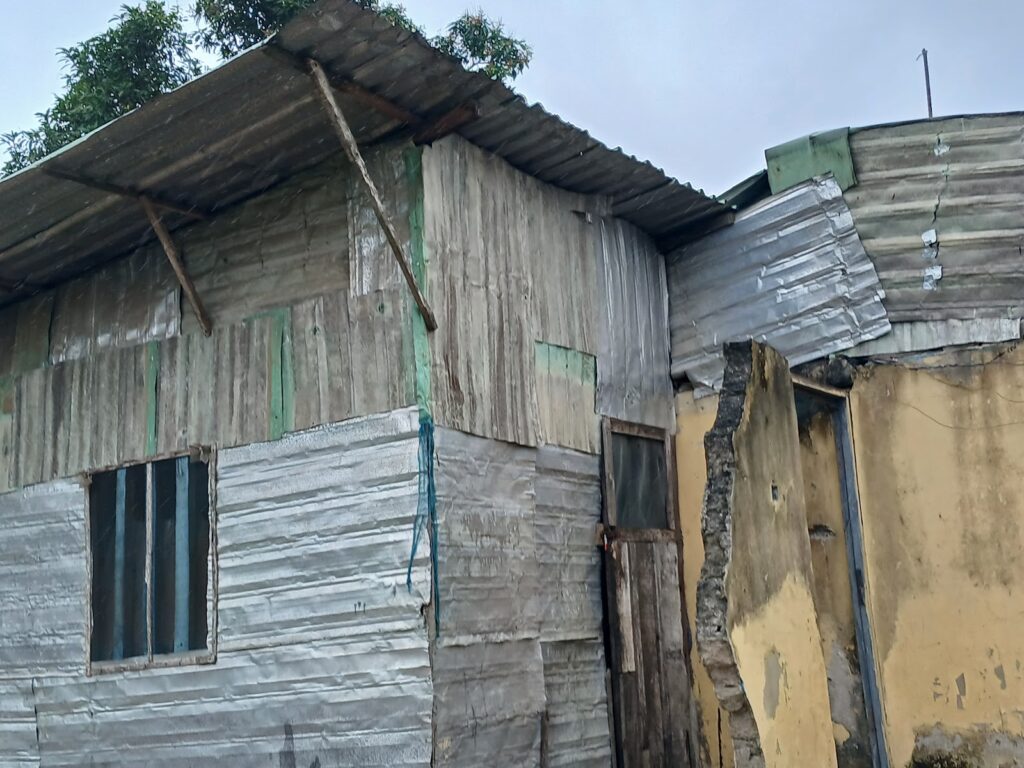
Meanwhile, the lack of adequate welfare for soldiers is forcing many personnel to resign from their jobs. Nearly 400 officers resigned in 2020 alone over loss of interest.
As soldiers continue to resign, those still in service are overstretched.
“As of 2022, Nigeria, with an estimated population of about 220 million people, has a total military strength of about 223,000 personnel. This gives a ratio of military personnel to a population of approximately 11,000. This is lower than those of Nigeria’s neighbours except Niger (Republic),” ex-minister of defence, Salihu Magash, said in February.
Commenting on this, a security analyst, Timilehin Ajibola, told HumAngle that the authorities must take the welfare of military personnel seriously so that they do not resign in the middle of war.
Aside from the prompt payment of benefits for soldiers who died in active service, he said adequate accommodation, amongst other welfare packages, should be taken care of.
Soldiers living in Ojo barracks have, however, lost hope in the prospect of renovations that will address their challenges.
“We have been demanding for a long time, but there is no improvement. The government and the leadership of the security sector only make promises without fulfilling them,” one of them said.
Summary not available.
Support Our Journalism
There are millions of ordinary people affected by conflict in Africa whose stories are missing in the mainstream media. HumAngle is determined to tell those challenging and under-reported stories, hoping that the people impacted by these conflicts will find the safety and security they deserve.
To ensure that we continue to provide public service coverage, we have a small favour to ask you. We want you to be part of our journalistic endeavour by contributing a token to us.
Your donation will further promote a robust, free, and independent media.
Donate HereStay Closer To The Stories That Matter




